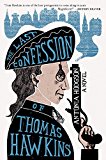Summary | Excerpt | Reading Guide | Reviews | Beyond the book | Read-Alikes | Genres & Themes | Author Bio

Set in the untamed wilds of nineteenth-century colonial India, a dazzling historical thriller introducing an unforgettable investigative pair.
India, 1837: William Avery is a young soldier with few prospects except rotting away in campaigns in India; Jeremiah Blake is a secret political agent gone native, a genius at languages and disguises, disenchanted with the whole ethos of British rule, but who cannot resist the challenge of an unresolved mystery. What starts as a wild goose chase for this unlikely pair - trying to track down a missing writer who lifts the lid on Calcutta society - becomes very much more sinister as Blake and Avery get sucked into the mysterious Thuggee cult and its even more ominous suppression.
There are shades of Heart of Darkness, sly references to Conan Doyle, that bring brilliantly to life the India of the 1830s with its urban squalor, glamorous princely courts and bazaars, and the ambiguous presence of the British overlords - the officers of the East India Company - who have their own predatory ambitions beyond London's oversight.
Calcutta, September 1837
The palanquin lurched again to the left and I felt a fresh wave of nausea. I pushed the curtains aside in the vain hope of a current of cool air, and waited for the moment to pass. The perspiration started anew from my neck and my back, then soaked into the chafing serge of my second-best dress uniform. The dull, sour odour filled me with dejection. Our uniforms were not washed quite as often as I would have liked as it caused the fabric to disintegrate even more swiftly than it would otherwise have done.
'Khabadur you soor!' Take care, you swine! I shouted at the bearers, more to relieve my feelings than anything else.
'William,' said Frank Macpherson, 'it will make no difference.' Nor did it. There was no response, nor had I expected one.
Calcutta was hot. Not the infernal, burning heat of May, but rather the sticky, enervating sultriness of September. We were the only thing in the empty afternoon streets of Whitetown&#...
From a hanging in Jubbulpore to a tiger hunt in Doora and on to a mountain prison on the road to Mirzapore, The Strangler Vine is a riot of color and vibrancy. Carter is an historian and this is her first fictional outing. Certainly the novel is a highly detailed, vivid and authentic piece of historical writing. For all that it offers the reader however, it suffers from a slightly predictable plot and minimal character development...continued
Full Review
 (658 words)
(658 words)
(Reviewed by Kate Braithwaite).
 Charles Palliser, international bestselling author of The Quincunx
This is a gripping story of conspiracy and betrayal set in an early Victorian India that is rendered with complete conviction. And as a historian, the author offers a thought-provoking re-interpretation of the Thuggee story.
Charles Palliser, international bestselling author of The Quincunx
This is a gripping story of conspiracy and betrayal set in an early Victorian India that is rendered with complete conviction. And as a historian, the author offers a thought-provoking re-interpretation of the Thuggee story. Susan Elia MacNeal, New York Times-bestselling author of the Maggie Hope series
With gorgeous historical detail and deft characterization, Carter creates a rip-roaring detective romp - while also casting a gimlet eye on the effects of British imperialism and colonization of India.
Susan Elia MacNeal, New York Times-bestselling author of the Maggie Hope series
With gorgeous historical detail and deft characterization, Carter creates a rip-roaring detective romp - while also casting a gimlet eye on the effects of British imperialism and colonization of India. William Dalrymple, author of White Mugals: Love and Betrayal in Eighteenth-Century India
A splendid romp and just the job for a cold winter's evening in front of a blazing fire.
William Dalrymple, author of White Mugals: Love and Betrayal in Eighteenth-Century India
A splendid romp and just the job for a cold winter's evening in front of a blazing fire.In The Strangler Vine, a nomadic tribe of Indian bandits, known to history as Thugs, first charm and then strangle fellow travelers in the name of the Hindu goddess Kali. The appropriation of Kali by the Thuggee to justify their murders is the subject of some ongoing historical debate. While Kali is a Hindu goddess, it has been argued that a large number of Thugs were in fact Muslim. Doubts have further been raised about the existence of the Thuggee cult at all, as its existence was only recorded by British imperialists who may have had a vested interest in creating a feared band of murderers. A more recent and well-reviewed consideration of the evidence can be found in Thug: The True Story of India's Murderous Cult by Mike Dash.
Kali, ...

If you liked The Strangler Vine, try these:

The Last Confession of Thomas Hawkins
by Antonia Hodgson
Published 2017
In a new Georgian–era mystery by Antonia Hodgson, the follow-up to The Devil in the Marshalsea, Tom Hawkins prays for a royal pardon as he relives the espionage, underground dealings, and murder accusations that sent him to the gallows.

by Stephen Jarvis
Published 2016
A vast, richly imagined, Dickensian work about the rough-and-tumble world that produced an author who defined an age. Few novels deserve to be called magnificent. Death and Mr. Pickwick is one of them.




Dictators ride to and fro on tigers from which they dare not dismount. And the tigers are getting hungry.
Click Here to find out who said this, as well as discovering other famous literary quotes!